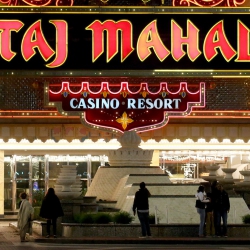Carl Icahn said he would sell the Trump Taj Mahal to Atlantic City Mayor Don Guardian at cost. Claiming he has invested $300 million in the Trump Taj Mahal, the activist investor said he would sell the casino to the city, if it would compensate him for his losses.
Don Guardian earlier in the evening called on Carl Icahn to sell the Trump Taj Mahal, take a profit, and “move on”. He said Carl Icahn’s decision to close the casino and leave it sitting is a “worst of the worst” of possible scenarios. The remarks were given during Don Guardian’s state of the city address earlier in the day.
Lost $300 Million on Trump Taj Mahal
Carl Icahn’s reply suggested he had lost close to $300 million the casino. The reply cannot be taken at face value, though. Given Atlantic City’s debt situation, lack of bank credit, and loss of control of finances to state of New Jersey overseers, Icahn’s reply could be seen as mockery of the mayor.
Carl Icahn added that Don Guardian could have offered some help during the Local 54’s strike last summer, but failed to do so. Icahn claims that the strike caused him to shut down the Trump Taj Mahal on October 10.
New Anti-Icahn Casino Bill
The New Jersey State Legislature is tied to the fate of the Trump Taj Mahal. At the behest of Senate President Stephen Sweeney, the New Jersey legislature passed a law which would make it impossible to reopen the Trump Taj Mahal in the next 5 years.
Lawmakers believed Carl Icahn had closed the Trump Taj Mahal in order to reopen it at some later time. In doing so, he would hire non-union workers to fill the jobs long-performed by the Local 54 of the UNITE-Here workers union. The law passed by the NJ state legislature there was meant to assure Carl Icahn could not brush aside union laws.
Is the Bill Unconstitutional?
Carl Icahn has said that the new casino law was unconstitutional, though the investor did not say whether he would file a legal challenge to the law. The part of the law Icahn challenged was the part which made the law retroactive to January 1, 2016 — meaning it only could apply to Trump Taj Mahal. Retroactive laws are on a shakier legal foundation.
Whatever the case, the suggestion by Carl Icahn that he would sell the Trump Taj Mahal to Don Guardian is not a serious one. Atlantic City is in massive debt, with a loss of about $70 million a year at present. Its credit rating is poor, so it would have a hard time receiving the financing to buy a $300 million casino.
Talk of Selling the Trump Taj Mahal
Don Guardian might have been referring to rumors that Carl Icahn is in discussion to sell the casino to other interested parties. While no confirmation has been given about which casino companies might be involved in the negotiations, Don Guardian is likely to prefer any solution to the closure of the Trump Taj Mahal.
Positive Signs for Atlantic City
The other 7 operating casinos in Atlantic City appear to be healthy for the time being. Each is turning a profit, though that should be expected when 5 casinos have closed in the past few years. A significant number of the customers from those 5 closures are likely to have stayed (and gambled at) a new casino, so the influx of customers has helped those remaining casinos.
The defeat of the North Jersey casino initiative on the November 8 ballot also was good news for Atlantic City. Many South Jersey supporters believed the development of casinos in East Rutherford and Jersey City would have been the death knell of Atlantic City, as in-state gamblers might have flocked to the bigger, newer resorts in the New York City verge. That is not a possibility until 2018, at the least — and probably closer to 5 years, since it takes several years to develop a casino.

